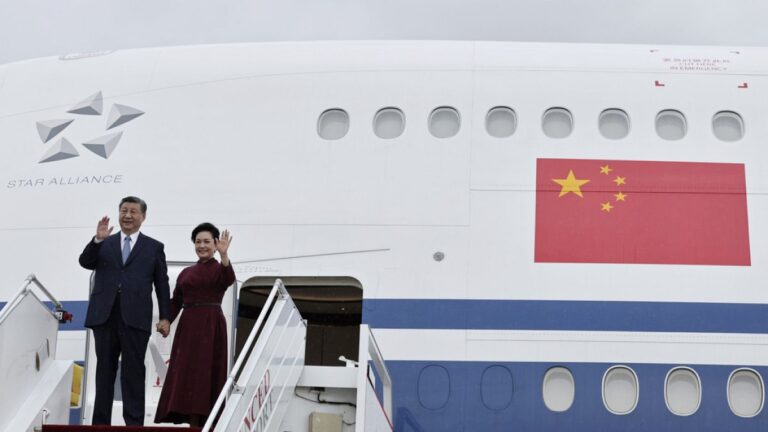Chinese President Xi Jinping began a tour of Europe on Sunday. What issues are up for debate in times of global tension?
The Chinese leader is on a trip to three European countries at a time when relations between China and Europe are far from perfect.
President Xi Jinping will visit France on Sunday and Monday as part of the 60th anniversary of the establishment of diplomatic relations between China and France, before visiting Serbia and then Hungary.
President Xi Jinping’s first official visit to Europe since the coronavirus disease (COVID-19) pandemic is set to include a jam-packed program.
What are the economic and strategic stakes of this highly political tour?
war in ukraine
The presidents of China and France will first address the issue of the Ukraine war.
According to Elysée newspaper, China is “one of Russia’s main partners” and French President Emmanuel Macron has urged China to “use the leverage it has against Russia” and “contribute to the resolution of this conflict.” He intends to encourage them to do so.
Officials in Beijing say they are officially neutral in the conflict and call for peace, but they have never condemned Russia’s full-scale invasion of Ukraine.
Meanwhile, trade between Russia and China in 2023 helped reduce the impact of economic sanctions on Russia.
Herville Fabry, senior research fellow in trade geopolitics at the Jacques Delors Institute, said: “The main concern is obviously any support given to China in terms of dual-use technology, and any updates to Russia’s military equipment.” We welcome any support that can contribute to this.” he told Euronews.
President Macron and European Commission President Ursula von der Leyen have issued a “clear signal” that Europe is “ready to sanction more Chinese companies for their critical support to Moscow’s war effort.” Asia Program Director Janka Oertel added. European Council on Foreign Relations (ECFR).
commercial policy
Discussions on trade policy issues are also expected to become lively.
France No. 1 aims to improve access for French and European companies to the Chinese market and gain a more level “competing field”, according to Elysée newspaper.
“The agreement is still being negotiated,” he added.
The EU’s trade deficit with China reached a record high of 396 billion euros in 2022, before falling by 27% to 291 billion euros in 2023, according to Eurostat.
“Europe’s concerns are very much centered around the imbalances that are occurring in the green technology sector,” Fabry said.
The European Commission has launched multiple investigations into Chinese subsidies for electric cars and solar panels that are suspected of distorting competition.
But Ertel said Macron’s two main messages about China’s support for the Russian military and China’s alleged market-distorting practices were unlikely to influence Beijing’s actions. Ta.
“Mr. Xi is not on a mission to repair relations because from his point of view everything is fine. He insists there is no excess production capacity.” [of green technology] And what is happening between China and Russia is just normal trade,” she explained.
Serbia and Hungary
The Chinese president continues his tour of Hungary and Serbia, which are widely seen as close to Moscow.
German lawmaker Reinhard Bütikofer said, “With his two visits to two European capitals, Xi Jinping has shown that he is actively working to establish an authoritarian axis in international politics.” .
The two countries are also considered gateways to China’s Belt and Road Initiative in Europe.
This flagship project, primarily funded by China, aims to rebuild the railway line between Budapest and Belgrade. Transporting Chinese products to Europe from the Greek port of Piraeus.
In Hungary, Chinese electric vehicle battery factories are mushrooming across the country, demonstrating the economic ties between Budapest and Beijing.
The visit coincides with the 25th anniversary of the 1999 NATO bombing of the Chinese embassy in Belgrade.
This is an opportunity for Xi to “create an image whose audience is primarily directed to the Global South rather than Europe,” such as “NATO overreach…selective use of international law by the United States.” [or] “Warmongering” contrasts with “China’s commitment to peace, dialogue and diplomacy,” Ertel concluded.

